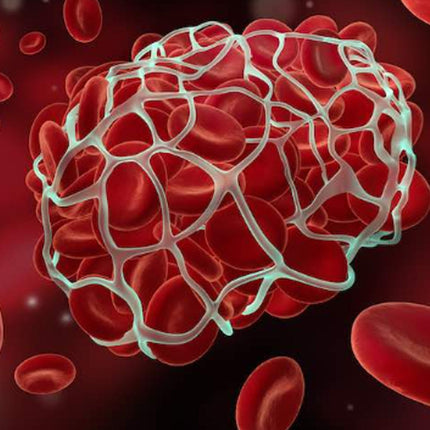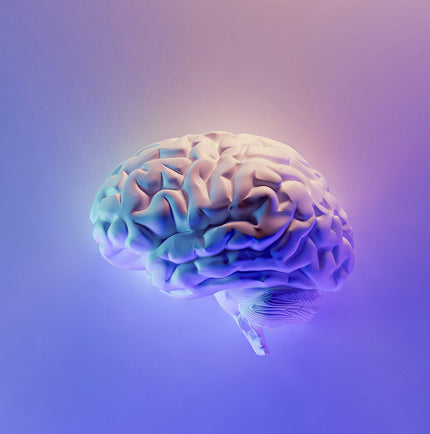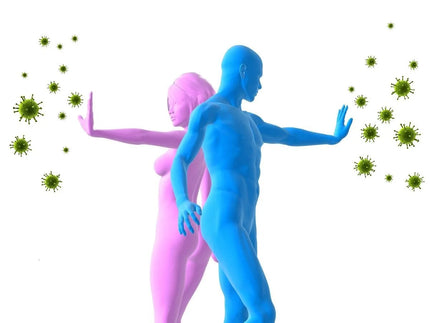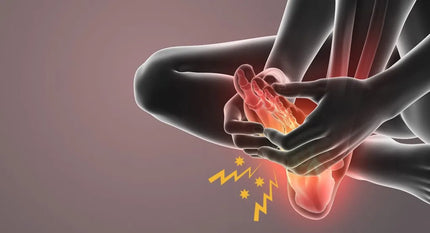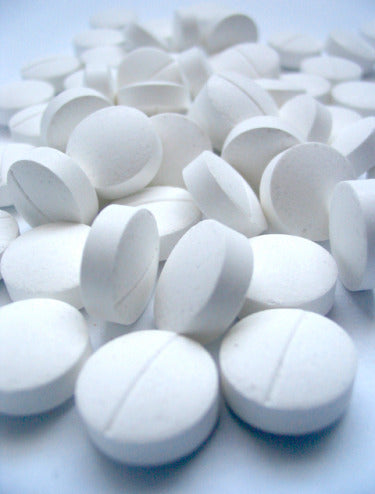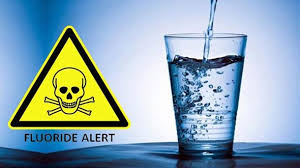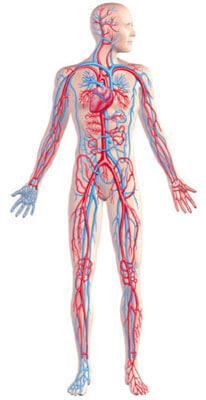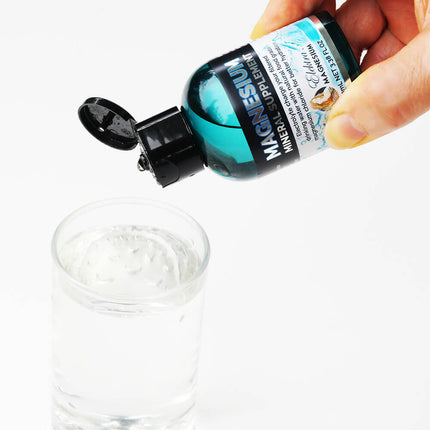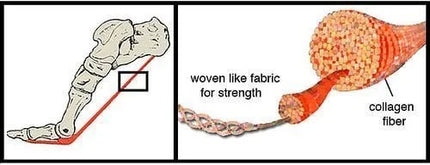Tax included and shipping calculated at checkout
As I sit here researching and writing about the relationship between magnesium status and menopause symptoms I am rubbing my chin at one particularly annoying spot… The one with that pesky single hair that grows out of the same spot ever since menopause. At least there is no more acne!
The new chin hairs that plague menopausal women are a result of dropping estrogen levels. When estrogen drops, the bit of testosterone that had been submerged becomes more prominent in that new hormone balance. This is often why, when you observe older couples, the woman seems to have become more dominant, confident and outspoken in the relationship, whereas the man, having dropped a bit of his testosterone level, has become slightly more submissive to his partner’s new-found bravery and confidence. It’s kind of cute to watch as their partnership evolves into the comfort zone of the golden years.
The quality of life in these years will be directly related to the quality of diet and lifestyle – including the presence of optimal magnesium. Adequate magnesium helps us breeze through menopause and into our golden years. Say goodbye to sweaty sleepless nights with cramps; feel calm and relaxed; focused and in control; and stay juicy and flexible longer! Enjoy the second half of life the way you are supposed to with plenty of magnesium, the most important mineral for energy metabolism, and as essential to life as water. (Except, it won't prevent that pesky chin hair!).
Magnesium is critical to several processes including:
“hormone receptor binding;
gating of calcium channels;
transmembrane ion flux and regulation of adenylate cyclase;
muscle contraction;
neuronal activity;
control of vasomotor tone;
cardiac excitability;
and neurotransmitter release.” [1]
“You can trace every sickness, every disease, and every ailment to a mineral deficiency.”
Dr Linus Pauling (two-time Nobel Prize winner)
Peri Menopause
Peri menopause can start in the thirties or forties and is marked by intermittent ovulation and menses. It’s not until you have a cessation of periods for more than a year that you are deemed to be in full menopause. Magnesium deficiency can occur at any age, but can become particularly pronounced by peri menopause due to the stresses caused by these hormonal changes.
Many researchers have called magnesium the miracle mineral or the anti-aging mineral because its effects and functions are so ubiquitous. It is the single most important mineral to the body with about 350 different functions, supporting enzyme activity and co-factoring with other essential nutrients like calcium, iron, zinc and vitamin D.
Magnesium is also the one most likely to be in short supply in modern industrialised societies because soils and our food supply have become magnesium-depleted and we suffer considerably more from a multitude of stresses – particularly chemical stressors. Many chemicals and heavy metals can block magnesium in the body, so that even if we are getting the average recommended amount of magnesium, we can’t use it well.
Without enough magnesium the body will have trouble detoxifying and cleaning its cells properly, or replacing cells efficiently. This leads to acidification of cells (like a compost heap), lower metabolism and clogging up of vascular systems and joints over time. All these processes need electrical energy via mitochondrial production of ATP – which depends on magnesium.
Hormone Balance and Magnesium Calm
Magnesium deficiency makes us less able to deal with stress and recover well, leading to over-emotional outbursts and even depression.
As magnesium is essential for the synthesis of cholesterol [11], it is used to make DHEA, the master hormone precursor at the head of the cascade of hormones from which estrogen, progesterone, testosterone and other hormones are made.
Dehydroepiandrosterone (DHEA) is a hormone produced primarily by the body’s adrenal glands. Levels peak at about age 25, then go down steadily with age. DHEA levels drop to only 10 to 20% those in young adults by 70-80 years of age. When magnesium and DHEA levels drop and if the thyroid is struggling and adrenals are overworked, stress goes through the roof and premature ageing sets in.
Perimenopause can come too early, or menopause can have disastrous symptoms manifesting as restless legs, sleep disorders, excessive stress reactions and oversensitivity, hot flashes and profuse sweating, heart arrhythmia and dryness in various places, including the vagina, bowel and skin. Bones also become dryer and more brittle and prone to breakage.
If you have had chronic stress and your adrenals have been in overdrive producing adrenaline and cortisol, they may become so exhausted that production of DHEA is compromised. Less DHEA then effects overall hormone balance, leading to estrogen dominance symptoms and more stress hormone release. This can make us overly teary, emotional, fragile, anxious, bloated, inflamed – and generally feeling like crap. There can also be a low energy chronic fatigue state and a feeling of not being able to cope (often connected with thyroid insufficiency).
Not only is magnesium required to make DHEA, but the presence of magnesium also has a dampening effect on stress hormones.
Estrogen Dominance Symptoms
Symptoms of pre-menstrual tension (PMS) are often expressions of estrogen dominance in that part of the menstrual cycle. It’s also a time when women crave cacao and other magnesium-rich foods the most!
If high estrogen levels can cause PMS symptoms, why can a lower estrogen production by ovaries in menopause also manifest as symptoms of estrogen dominance?

Natural estrogen is actually protective of magnesium stores and helps to recycle and distribute magnesium more efficiently. There is a very beneficial relationship with natural estrogen and magnesium. This is why women in their child-bearing years are less prone to cardiovascular disease compared to men.
Estrogen produced naturally by the body in the right amount is cell protective because it conserves magnesium loss. Magnesium and estrogen work in tandem in our younger years to keep us flexible and juicy. They also support the immune system. However, when estrogen is in over-supply and the body can’t eliminate it to balance its levels properly, it can become a monster. The body usually does not produce more estrogen than it needs, but we can be exposed to other sources which upset the balance.
In menopause we don’t actually lose the ability to produce estrogen just because the ovaries have retired. Estrogen is still produced in adrenal glands and fat cells! The more fat, the higher the likelihood of estrogen dominant symptoms. But it gets even more complex: Fat cells also store toxins and wastes that the body has trouble eliminating, which then contribute to body burden and magnesium depletion.
Consumption of soy milk products can also contribute to estrogen dominant symptoms due to their phyto-estrogens (which are not neutralised by fermentation as in soy sauce).
Another reason for estrogen dominance symptoms is excessive synthetic chemical estrogens in the environment. Estrogen-mimickers prevent the body’s natural estrogen from attaching to cells. This creates a toxic residue and stress for the body, generating stress hormones – yet the benefit of natural ‘real’ estrogen remains elusive. Many people are exposed to such chemicals in the form of Bisphenol-A, which mimics estrogen, whilst pthalates block the action of testosterone, a competitor of estrogen.
The Pill or estrogen replacement therapy medications are alternative synthetic means of supplementing estrogen. These methods do not necessarily provide balance and respite because, funnily enough, they can also lead to magnesium depletion. “Women taking combined hormone replacement therapy (HRT) are 2.7 times more likely to develop breast cancer than non-users, and the risk may increase with longer use, a study published in the British Journal of Cancer has found.” BMJ 2016;354:i4612
Magnesium can counter-act the effect of estrogen dominant symptoms by calming down the endocrine system and dampening down stress hormones. “Examinations of the sleep-electroencephalogram (EEG) and of endocrine systems point to the involvement of the limbic-hypothalamus-pituitary-adrenocortical axis as magnesium affects all elements of this system. Magnesium has the property to suppress hippocampal kindling, to reduce the release of adrenocorticotrophic hormone (ACTH) and to affect adrenocortical sensitivity to ACTH. “ [10]
Sleep
Magnesium is also involved with production of melatonin (another hormone and powerful antioxidant) via the pineal gland, which regulates circadian rhythm and sleep cycle. The older we get, the more plagued we become with sleep disorders. A good sleep is absolutely essential for the brain to detoxify itself, as the melatonin produced by the pineal gland during deep sleep is a powerful antioxidant. It cleans out the cobwebs overnight!
Stress and Increasing Magnesium Deficiency
“Magnesium influences body temperature through its central sedative effect on the hypothalamus and downstream endocrine system, as well as via its effect of reducing neuromuscular excitability.” [1]
This presents a double whammy because if you have magnesium deficiency you are more likely to have excessive bouts of perspiration and hot flashes. The more stressed you get from the hot flashes, lack of sleep and perspiration, the lower the magnesium levels get: A ‘Catch-22’ situation because Magnesium is lowered during hyperthermia (excessive body temperature) due to stress, sweating and magnesium diuresis (kidney excretion). Higher body temperatures lead to dehydration (unless you are keeping up by drinking enough water). Dehydration leads to further stress and magnesium loss. And down it keeps going.
Stress, anxiety and trauma are some of the biggest contributors to magnesium deficiency because they trigger excessive magnesium loss, ie. hypermagnesuria (loss of magnesium via urine). We are supposed to be able to recycle most of our magnesium via the kidneys, but many factors can interfere with this process - particularly stress. There can also be renal insufficiency or genetic reasons why some people are big magnesium wasters.
Our modern societies are now plagued with stressful and polluted environments, financial pressures and excessive work loads. Most people are magnesium deficient these days: It just varies by degrees.
Researchers Drs Mildred Seelig and Andrea Rosanoff reported in their book The Magnesium Factor [9] that the lower the magnesium levels get, the more acute our stress responses. In other words, we can go to pieces in response to the smallest provocation. Low magnesium primes us for hyper-excitability, stress sensitivity and also inflammatory responses, metabolic syndrome and low energy depressive states.
Low magnesium is the fundamental link to hyper-excitability of muscles (as in cramps and involuntary spasms) and inflammatory responses. As magnesium levels drop, calcium moves into the calcium channels, triggering stress hormone release. This also has somewhat of a dehydration effect, as magnesium's exit causes cells to lose water. It's part of the 'squeezing' effect.
Magnesium however relaxes the muscle fibres again when it's time to move back to the parasympathetic mode (rest and digest mode), by moving in with hydration (which flexes) and pushing out the calcium from the membrane channels. This then dampens the effect of adrenalin and cortisol. [1].
“Magnesium is known to have a marked anti-adrenergic effect. This is mediated by a variety of mechanisms, of which the most important is probably calcium antagonism. Calcium plays a fundamental role in stimulus-response coupling of catecholamine release from the adrenal medulla and adrenergic nerve terminals, and its role in adrenal catecholamine release has been well described for more than 30 years.”
Normally, muscles and the smooth muscles of the endothelial linings of our vessels work like this: Contract ~ Relax ~ Contract ~ Relax. But when there is not enough magnesium there is more and more Contract ~ Contract ~ Contract, which can make us feel like a hard stress ball that can't unwind. Stiffness and tension increase. Blood pressure can rise. Recovery feels elusive.
In magnesium deficient states cell pollution accumulates and we can get 'squeezed', pinched, deprived of oxygen, hypertensive, inflamed and prone to headaches or migraines.
Low Magnesium, Premature Aging and Menopause

Premature ageing is usually marked by excessive weight gain (especially adipose tissue around the middle), exaggerated dehydration, hypercalcemia, joint stiffening, acidosis and inflammation. In other words, getting overweight, dry and stiff with creaky and brittle bones before our time.
Skin can also get very dry and saggy looking. As we need magnesium to synthesise collagen proteins and elastin fibres, which are the structures that hold us together as skin, bone, ligaments, sinew, smooth muscle walls in arteries etc, low magnesium means those structures lose their integrity. [6] Thus magnesium helps us to stay more hydrated, flexible and stretchy longer!
Metabolic Syndrome and Acidosis
Low magnesium leads to metabolic syndrome and diabetes [5] because the mitochondria must have vital magnesium to make ATP – adenosine triphosphate – the energy currency of the cell. When magnesium is too low you are forced to switch from fat burning metabolism (aerobic) to sugar burning (anaerobic) which is much less efficient in producing ATPs and results in more acidic by-products leading to acidosis.
Acids are free-radicals that dissolve us faster because they are ‘electron-stealers’. Free radicals age and deteriorate us faster. They steal our energy and life force. Anti-oxidants however are electron-donors and help to neutralise the acids to help us keep balance, with more available energy. Magnesium is an electron-donor and thus an ‘antioxidant’ nutrient.
Magnesium assists insulin to take glucose into our cells to make energy. Not only that, but it takes 28 magnesium molecules to process one sucrose molecule into energy, and 56 magnesium molecules for one fructose molecule. Normally Nature packs fruits and vegetables with enough vitamins, minerals (eg. magnesium) and enzymes to process the sugars that they contain.
However, our farming and food processing tends to leach out all or almost all of the magnesium goodness, which means when you eat the processed stuff it can actually steal magnesium from cellular stores so that at least some fuel can be turned into energy. That’s right: SUGAR DEPLETES MAGNESIUM.
Magnesium deficiency is thus always associated with sugar sensitivity, insulin resistance, chronic fatigue, low pH (acidity), and metabolic syndrome (diabetes). The worse magnesium deficiency gets, the harder it is to keep off excess weight, despite our careful attention to calorie intake. We eat, but the body does not seem to be able to get the nutrients and energy it needs…
As each energy cycle produces more acids, without enough antioxidant ‘electron donors’, the cell pH starts to slide backwards. Acidic free radicals then oxidise our good cholesterol fats, HDL (high density lipoproteins), which turn into destructive LDL (low density lipoproteins). When the doctor measures your cholesterol levels it is this LDL they are looking for, because the LDL clogs up our arterial tubes. It kind of likes to stick to those calcium deposit lesions on the lining of arteries, narrowing the passageways and inhibiting flow. One good side effect is that these cholesterol plugs can block blood leaks from calcium lesion splits (not sure which is worse). In any case, if you had enough magnesium to control the calcium you could avoid the calcium lesions, as well as formation of the bad cholesterol plugs.
We desperately need our HDL fats because they are essential for the brain and nervous system function, skin barrier, as well as cell membrane integrity. Medications that remove all kinds of cholesterol can be dangerous (check with your doctor).
The liver uses cholesterol to clean itself; joints and gut lining need it for lubrication and mother’s milk is also rich in it. We need the good HDL cholesterol fats for life itself – like magnesium and like water!
Sugar Cravings: Because we need oxygen and magnesium in order to turn fat into energy, magnesium deficiency traps us in a vicious cycle of anaerobic (without oxygen) sugar metabolism. This also produces less ATP energy molecules (2) compared to aerobic fat metabolism (38).
Ever-increasing ravenous cravings for more sugar follow as we seek, like a drug addict, the instant ‘fix’. A burn and crash cycle develops of sugar-burning hit, followed by an energy crash, followed by sugar hit. We end up consuming more sugar and processed (dense) carbohydrates to quench our energy starvation, but they actually produce less energy output because of insulin resistance (due to magnesium deficiency). The surplus blood glucose (from the carbs) then has to be removed from the blood by taking it to the liver to store as fat (adipose tissue cells). Voila: Bigger love-handles, tummies and bottoms.
An optimal magnesium status (combined with moderate exercise and balanced fresh food diet) equates to more efficient energy production, cell hydration and alkalinity, as well as healthy weight maintenance.
Heart Disease, Thrombosis and Stroke
Because magnesium has two spare electrons in its outer shell which it can donate to electron stealers (free radicals), it promotes an anti-oxidant negative-charge electrical effect. Low magnesium leads to thrombosis and blood clotting. [7]. Sufficient magnesium reverses these conditions and restores the blood's negative charge and fluidity (zeta potential).
Magnesium is a NATURAL calcium controller and calcium channel blocker. [1]
The lower the magnesium the more prone we become to hypertension (high blood pressure) because the blood gets thicker and arterial linings get harder.
When calcium deposits from the blood into the endothelial lining of the arteries it can prevent the arterial wall from flexing enough with each pump of blood. At those points it can cause micro tearing of the lining, commonly called 'calcium lesions'. The increasing rigidity and dryness of the arterial wall, caused by the combination of excess calcium and deficiency in magnesium, contributes to hypertension.
As magnesium, oxygen and the pH of cells drop, the hydration state in the cell also drops. Low oxygen and low pH (acidosis) means low cell voltage, leading to a positive charge where blood cells start getting attracted and stuck together. This is because low magnesium allows too many calcium ions into tissue cells and blood plasma, which creates an attractive force. Excessive calcium, over-balancing magnesium, can lead to thrombosis, producing sticky positively charged platelets which make cells to clump together and clot.

Magnesium and oxygen promote a negative charge, which inhibits platelet stickiness (attraction) and allows cells to bounce off one another and move freely in the plasma.
When your electrolytes (magnesium, calcium, sodium, potassium) are in the right relationship to one another it enhances the ability of your cells to hold water and avoid dehydration. It means that your detoxification pathways can work better to flush out waste products and toxins. Circulation improves. Heart rhythm normalises. It also means that you can produce and conduct energy more efficiently. This energy in turn supports enzymes for detoxification, as well as to build new cells and repair DNA. All good!
Osteoporosis
If you are getting cramps and restless legs despite your blood tests not showing magnesium deficiency, here’s why: Measuring magnesium in the blood serum is not indicative of tissue magnesium levels, as plasma contains less than one percent of magnesium ions, whereas bone and muscle tissue cells contain most of the other 99%. It is possible to have a normal magnesium plasma result, even though muscle and bone tissue levels are deficient, because these tissue cells can sacrifice magnesium reserves in order to keep blood levels stable.
Post-menopausal women tend to experience a deterioration in bone strength and skeletal integrity as a result of magnesium deficiency. “Magnesium deficiency contributes to osteoporosis directly by acting on crystal formation and on bone cells and indirectly by impacting on the secretion and the activity of parathyroid hormone and by promoting low grade inflammation.” [2]
When magnesium gets low, calcium leaches out of the bones and settles in the soft tissue. Calcium can deposit in the joints (arthritis) or form heel spurs, which feel gritty and irritating, sometimes causing pain and inflammation. Calcium crystals are also prominent in kidney stones, which can be pretty painful!
Loss of magnesium from bones can lead to brittle bones that break easily. More calcium can enter the bone if fluoride (from processed foods and tap water) is present because they attract. However, the calcium and fluoride combo just makes the bones thicker and more brittle. Bones are made up of many different minerals, phosphate being the real great strengthener. But it’s the magnesium that gives bones more shock-absorbing capacity and bounce to make them more resilient.
Immune System
Low oxygen states and acidosis (low pH) also promote the right condition for pathogenic invasion and proliferation. In other words, the bugs move in to eat you for lunch. When the bugs move in you get inflammation and pain in various places and your immune system dips low. You catch colds easily, get headaches and feel under the weather. Magnesium however strengthens the immune system. [8] It is a great cell defender.
Cancer
In a study by the University of Athens [3, 4], scientists found that low magnesium status itself is carcinogenic because we need magnesium to repair damaged DNA links. The same study recommended to oncologists that they supplement their patients with extra magnesium because the radiation and chemotherapies cause excessive loss of magnesium.
Natural Absorption of Magnesium
What can we do to mitigate the effects of menopause? To increase our youthfulness and stave off the effects of ageing? The answer is simply good nutrition and plenty of fresh air, sunshine and exercise.
Magnesium-rich foods include seaweed, coconut, cacao, green vegetables, nuts, seeds, legumes and bone broth.
Grandma's Chicken Soup
One of the main reasons Grandma’s chicken and vegetable soup helps you recover more quickly from illness is because the soup brine contains a bunch of minerals (particularly magnesium and zinc) and gelatine from the bones, as well as healthy fats. Sodium is also antagonistic to pathogens. Seasonings of parsley, garlic, onions and ginger are also great herbal healers. These are the type of alkalising foods that feed our beneficial gut bacteria, which can overcome the toxin-producing bacteria, viruses and yeasts like candida.

Soups are a great way to get nutrients without burdening the digestive system too much. The older we get the less stomach acid we produce so we need more vegetable smoothies and paleo soups that partly digest the foods for us and make it easier to absorb the nutrients. Age also brings with it a lessening production of sodium bicarbonate by the pancreas – which we need to help neutralise acids. A big pinch of bicarb soda in water daily (not together with food of course) will help to buffer the acid by-products so the body can restore balance.
If you are not well or very stressed with pain and inflammation, the digestive system is likely not working optimally. That’s why we don’t feel all that hungry when we are sick. The body needs to ration the energy supply for the more important jobs – like driving the heart muscle and pumping blood, feeding the brain, moving lungs and healing. You see? Grandma knew!
Grain Brain
Grains used to have much more magnesium than they do now. Due to mineral-deficient industrial farming methods, glyphosate and over-processing, they have become very difficult to digest, leading to unwanted excess fat. The toxic residues from these foods can also depress production of certain neurotransmitters, leading to mental instability, bad memory or foggy brain. So they are best to avoid unless you can get hold of high protein traditional organic grains, and to ferment or sprout them for enhanced digestibility.
Processed carbohydrates, devoid of their naturally packaged minerals, are high on the glycemic index and act like sugar in the body, requiring anaerobic metabolism and resulting in acidosis. Low pH (=acidic) then means we become starved of oxygen, which then inhibits fat burning metabolism.
The auto-immune Paleo Diet is exceptionally good to manage gut disorders and a good place to start.

Magnesium is easier to absorb from the bowel in the presence of fermented vegetables.
“It is concluded that sc-FOS feeding resulted in a significant increase in intestinal Mg absorption in postmenopausal women.” [12]
Magnesium supports our beneficial gut bacteria, which in turn assist digestion, inhibition of pathogenic bacteria, as well as the care of our gut lining to avoid leaky gut syndrome. Gut disorders, inflammatory bowel and gut dysbiosis have been associated with depression, anxiety and mental illness. [13]
It can take quite a while to restore optimum gut health. It happens one brick at a time – but at least it happens, so be persistent. In the meantime, what do you do about replenishing magnesium stores? Using transdermal magnesium takes a short cut via the skin. You can go swimming in the ocean every day to absorb your magnesium, or enjoy a magnesium chloride bath or footsoak, or massage Magnesium Cream and/or Magnesium Oil into the skin. Magnesium soaking allows for better detox as well as promotes a good night's sleep.
Magnesium Cream is a luxurious skin-reviving and protective formula that helps keep your skin looking younger longer and at the same time supplies a daily magnesium supplement far superior to tablets and powders. Magnesium ions are easily absorbed this way and provide very fast relief from muscle tension, cramps and restless legs. It’s also wonderfully calming and relaxing. Magnesium is a Godsend!
Here is an email comment from a lady who works for a vascular surgeon at a major Sydney hospital who has used Elektra Magnesium Cream;
“I haven't had to use the progesterone cream in over two weeks to combat hot flushes as the cream seems to regulate the hormones.”

Another lady emailed after using it,
“My menopausal symptoms have been very dramatically improved by the use of the product. The night sweats have definitely been less bothersome, sometimes I am largely unaware of the ‘hot flush’ at all. My sleep patterns have been much better, having very deep and relaxed sleep.”
These types of experiences are very common. During my menopause years I also was able to alleviate my heart arrhythmia and other symptoms of hypothyroidism using transdermal magnesium. You can use as much as you like to manage the symptoms without harmful side effects. It is just a way to feed the body via skin. The epidermis will hold onto the nutrients (magnesium, vitamins and lipids) as the body absorbs at its own self-regulating pace (if those nutrients are available). Easy!
So take a chill pill by increasing your magnesium nutrition and discover that menopause is no big deal thanks to magnesium!
REFERENCES:
- Fawcett, W.J., E.J. Haxby, and D.A. Male, Magnesium: physiology and pharmacology. BJA: British Journal of Anaesthesia, 1999. 83(2): p. 302-320.
- Castiglioni, S., et al., Magnesium and Osteoporosis: Current State of Knowledge and Future Research Directions. Nutrients, 2013. 5(8): p. 3022-33.
- Anastassopoulou, J. and T. Theophanides, Magnesium–DNA interactions and the possible relation of magnesium to carcinogenesis. Irradiation and free radicals. Critical Reviews in Oncology / Hematology. 42(1): p. 79-91.
- Park, H., et al., A pilot phase II trial of magnesium supplements to reduce menopausal hot flashes in breast cancer patients. Supportive care in cancer : official journal of the Multinational Association of Supportive Care in Cancer, 2011. 19(6): p. 859-863.
- Barbagallo, M. and L.J. Dominguez, Magnesium and type 2 diabetes. World J Diabetes, 2015. 6(10): p. 1152-7.
- Senni, K., A. Foucault-Bertaud, and G. Godeau, Magnesium and connective tissue. Magnes Res, 2003. 16(1): p. 70-4.
- Maier, J.A.M., et al., Low magnesium promotes endothelial cell dysfunction: implications for atherosclerosis, inflammation and thrombosis. Biochimica et Biophysica Acta (BBA) - Molecular Basis of Disease, 2004. 1689(1): p. 13-21.
- Kubenam, K.S., The Role of Magnesium in Immunity. Journal of Nutritional Immunology, 1994. 2(3): p. 107-126.
- Seelig, M.S. and A. Rosanoff, The magnesium factor. 2003, New York: Avery.
- Murck, H., Magnesium and affective disorders. Nutr Neurosci, 2002. 5(6): p. 375-89.
- Rayssiguier, Y., E. Gueux, and D. Weiser, Effect of magnesium deficiency on lipid metabolism in rats fed a high carbohydrate diet. The Journal of nutrition, 1981. 111(11): p. 1876-1883.
- Tahiri, M., et al., Five-Week Intake of Short-Chain Fructo-Oligosaccharides Increases Intestinal Absorption and Status of Magnesium in Postmenopausal Women. Journal of Bone and Mineral Research, 2001. 16(11): p. 2152-2160.
- Winther, G., et al., Dietary magnesium deficiency alters gut microbiota and leads to depressive-like behaviour. Acta Neuropsychiatr, 2015. 27(3): p. 168-76.
BMJ 2016;354:i4612
By Sandy Sanderson © 2017 (Published in Masters of Health Magazine) Menopause








